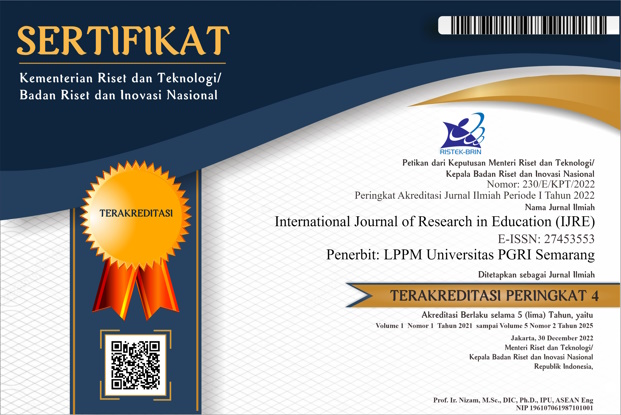EFL Students’ Needs in Promoting English Speaking Skills at Lower Secondary Schools
DOI:
https://doi.org/10.26877/ijre.v4i2.457Keywords:
EFL students’ needs, English, Speaking skills, Lower secondary schoolsAbstract
EFL Students’ needs for spoken English are considered important to fulfill, and the idea to capture what they need requires some ways and efforts so as to make them eager and keen on practicing English better. However, an analysis on needs environment is not much discussed and conducted for EFL students, mainly in lower secondary schools. Thus, the aim of this study is to examine the needs of EFL students in terms of enhancing their English-speaking skills in lower secondary schools. Three ninth-grade students from three distinct lower secondary schools located in Depok, West Java, Indonesia were the subjects of the research. This study employed a qualitative design with descriptive analysis, and the instrument used to collect the data was semi-structured interviews. The resulting data was analyzed with some steps such as reduction of data, data display, and data presentation. The results demonstrated that EFL students’ English-speaking proficiency is influenced by a variety of needs, including necessities, lacks, and wants. Considering the significance of these needs in the enhancement of EFL students' English-speaking abilities, it is advisable that teachers of English should comprehend and employ efficient learning strategies and stimulating learning media that facilitate the progress of students' English-speaking capabilities.
References
Abid, A. (2020). Promoting English Speaking Skills: Lessons Learnt from the EFL Classrooms Context. European Journal of Foreign Language Teaching. https://oapub.org/edu/index.php/ejfl/article/view/3054
Akbar, H., Hakeem, Z. H., & Ahmad, S. (2022). English Grammar Rules as an External Barrier Faced by EFL Students for Effective Communication. Global Language Review, VII(II), 418–428. https://doi.org/https://doi.org/10.31703/glr.2022(vii-ii).34
Awayed-Bishara, M. (2021). A critical intercultural stance from the margins: EFL education in a conflict-ridden context. Language and Intercultural Communication, 21(4), 515–529. https://doi.org/https://doi.org/10.1080/14708477.2021.1957910
Burden, P. (2004). The teacher as facilitator: Reducing anxiety in the EFL university classroom. JALT Hokkaido Journal, 8(1), 3–18. https://doi.org/https://jalthokkaido.net/pluginfile.php/%0B52/course/section/24/Burden.pdf.
Chi, H. T. (2020). Suggestions for Promoting Students’ Participation in English Speaking Classes: Students’ Perceptions. European Journal of Education Studies, 7(11). https://doi.org/https://doi.org/10.46827/ejes.v7i11.3378
Cohen, L., Manion, L., & Morrison, K. (2018). Research Methods in Education. In Routledge (8th ed.). Routledge.
Dahl, L. E. (2019). Promoting EFL oral skills in and outside school: Norwegian lower secondary students’ and their EFL teachers’ experiences and beliefs. University of Stavanger, Norway. https://uis.brage.unit.no/uis-xmlui/handle/11250/2603071
Dewi, R. S., Kultsum, U., & Armadi, A. (2017). Using Communicative Games in Improving Students’ Speaking Skills. English Language Teaching, 10(1), 63–71. https://doi.org/https://doi.org/10.5539/elt.v10n1p63
Everitt, B. S., & Howell, D. C. (2021). Encyclopedia of Statistics in Behavioral Science–Volume 2. John Wiley & Sons, Ltd. https://doi.org/https://doi.org/10.1002/0470013192
Garcés-Manzanera, A. (2021). EFL Education-oriented reading and speaking skills through critical thinking: a theoretical basis for the degrees in education. EDU REVIEW. International Education and Learning Review/Revista Internacional de Educación y Aprendizaje, 9(4), 387–398. https://doi.org/https://doi.org/10.37467/gkarevedu.v9.2976
Ihsan, M. D. (2020). The application of presentation practice production method for teaching speaking skill: The perception of teachers and students. Jurnal Inspirasi Pendidikan, 10(1), 30–40. https://doi.org/https://doi.org/10.21067/jip.v10i1.3854
Lertchalermtipakoon, P., Wongsubun, U., & Kawinkoonlasate, P. (2021). Need Analysis: English Language Use by Students in the Tourism and Hospitality and Industry. English Language Teaching, 14(3), 59–71. https://doi.org/https://doi.org/10.5539/elt.v14n3p59
Liando, N. V. F., Sahetapi, R. J., & Maru, M. G. (2018). English major students’ perceptions towards watching English movies in listening and speaking skills development. https://doi.org/https://doi.org/10.14738/assrj.56.4627
Miles, M. B., Huberman, A. M., & Saldana, J. (2014). Qualitative data analysis (3rd ed.). Sage.
Monica, M. (2019). Using Needs Analysis to Develop Global Education Based ELT Materials in Transactional Speaking Skills. https://doi.org/https://doi.org/10.34050/els-jish.v2i1.6235
Namaziandost, E., Neisi, L., Kheryadi, & Nasri, M. (2019). Enhancing oral proficiency through cooperative learning among intermediate EFL learners: English learning motivation in focus. Cogent Education, 6(1), 1683933. https://doi.org/https://doi.org/10.1080/2331186X.2019.1683933
Oktavia, D., & Lestari, R. (2022). Students’ Perception on Learning Speaking English by Using English Domino Games: The Case of a Private University. Indonesian Research Journal in Education| IRJE|, 6(1), 28–42. https://doi.org/https://doi.org/10.22437/irje.v6i1.15327
Puspita, D. R., & Rosnaningsih, A. (2019). Need Analysis of Speaking Skill by Using Simulation for Students of Primary School Teacher Education. Journal of English Language Studies, 4(2), 159–169. https://doi.org/https://doi.org/10.30870/jels.v4i2.6197
Puspita Sari, D., Asiyah, S., Atiek Mustikawati, D., & Maghfiroh, A. (2021). The Difficulties Encountered by Non-English Department Students in Speaking English. English Focus: Journal of English Language Education, 4(2). http://eprints.umpo.ac.id/8232/
Saarahwati, H. H. (2020). EFL Undergraduate Students’ Strategies to Cope With Speaking Anxiety. https://dspace.uii.ac.id/handle/123456789/23637
Segaran, V. C., Sanmugam, S., Ismail, M. I., Siddek, N. A. J., Kamal, S. S. M., & Hashim, H. (2021). Language Learning Strategies (LLS) used by the Form Four Male Secondary School Students in Speaking Skill. International Journal of Academic Research in Business and Social Sciences, 11(7), 1382–1394. https://doi.org/https://doi.org/10.6007/IJARBSS/v11-i7/10253
Syahbani, D. M., & Apoko, T. W. (2023). Students’ Learning Anxiety and Speaking Skill in Lower Secondary School: A Correlation Study. Journal of Languages and Language Teaching, 11(3), 537–546. https://doi.org/https://doi.org/10.33394/jollt.v%vi%i.8162
Ting, S.-H., Marzuki, E., Chuah, K.-M., Misieng, J., & Jerome, C. (2017). Employers’ views on the importance of English proficiency and communication skill for employability in Malaysia. Indonesian Journal of Applied Linguistics, 7(2), 315–327. https://doi.org/https://doi.org/10.17509/ijal.v7i2.8132



